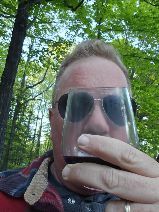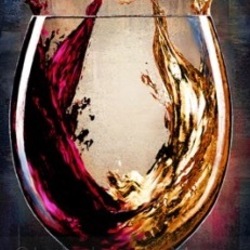Abbey Of Saint Hilaire
Saint-Hilaire
Brut Blanquette de Limoux Mauzac Blend 2022


Château Saint-Hilaire
Cru Bourgeois Médoc Red Bordeaux Blend 2016
After a initial rustic funky stink there is an immediate hit of almond and cherry. Very enjoyable, will buy again. — 3 years ago
Billecart-Salmon
Le Clos Saint-Hilaire Brut Blanc de Noirs 2005
Prior notes continue to apply…
When we visited Billecart-Salmon in October of 2021, we received a tour of the stunning estate. Along the way, our guide, Jerome, paused near a traditional “Clos” (a single vineyard, enclosed by a wall) on the property.
We could see a beautiful stone wall, surrounding a tiny 1 hectare parcel of “Clos Saint-Hilaire,” named after the Patron Saint & local church in Mareuil-sur-Aÿ, where Billecart-Salmon is located.
Although we didn’t go into the Clos, we learned about how special this parcel is to the family; how it’s exclusively planted to Pinot Noir with vines dating back to 1964; how work in the vineyard is performed by hand and horse-drawn plows; how this parcel is farmed according to an age-old savoir-faire, adhering to principles of sustainable viticulture.
The wine is pale gold with a prominent bouquet of yellow apple, Anjou pear, raspberry, lemon curd, white peach, white blossom, desiccated white rose, wet stones, biscuit, brioche, almond paste, marzipan, crusty croissant, pie crust, toast, creamy texture and persistent, fine-beaded mousse and long elegant finish.
This is a 2005 “Blanc de Noirs” Champagne, comprised of 100% Pinot Noir, all coming from Le Clos Saint Hilaire, vinified entirely in oak casks to lend texture and body, and aged over 13 years sur lie prior to its recent release. Due to the vineyard’s small size, production is very limited, and wine only produced in the best vintages.
Cheers to beautiful wines expressing a singularity of time and place!
Billecart-Salmon Le Clos Saint-Hilaire (2005). — 3 months ago


Château Montrose
Saint-Estèphe Cabernet Sauvignon Blend 2000
Served blind alongside what was eventually revealed to be a 1997 Freemark Abbey. This was the easiest of the pairings to get our heads collectively around as we felt confident this was Bordeaux and the other was from Napa. Unfortunately, I no longer have my notes for that wine but this was particularly memorable because I had held back a glass of the 1970 Montrose and had a lovely time tasting the two of those wines side-by-side. It was remarkable how much they had in common with one another. In fact, the only real difference between the two was that the 2000 just had more of its structure in tact. Other than that, the Montrose DNA was undeniable with loads of all the darkest, blackest fruits: currants and blackberries with coffee, tobacco, and graphite. At nearly 23 years young, the structure remains positively monumental. Despite all of that, it was ever so winsome. The finish was long with wonderful acid and lovely, ferrous minerals. Drink now with patience and over the next handful of decades. — 2 years ago
Saint Hilaire d'Ozilhan
Prestige Côtes du Rhône Grenache Blend 2020
Instantly likeable. Was a friend's introduction to Cotes due Rhone and it did not disappoint. A good example of the wine region. — a year ago
Grosjean Frères
"Chemin des Moines de Vergy" Pinot Noir 2021
Blinded, I honestly didn’t think much of it. It just didn’t have any defining character or complexity to stand out in the line up. Found this note off the interweb, which is relevant:
This is a relatively newly planted single vineyard that formerly was the land of the Monks of Vergy, and is situated along the path they took daily to reach the abbey of Saint-Vivant from Vosne-Romanée. It is at a higher elevation and looks down on the famous Grand Cru sites of Vosne Romanee; the soil here is clay limestone.
The wine is characterized by a dense purple color. The taste of wine is fresh, generous, with crisp acidity and a crisp nuances of oak wood. The finish is a little bluff. Aromatic bouquet of wine abounds with tones of ripe and juicy red fruit. — a year ago
Mommessin
Les Caves Grandes Exception Moulin-à-Vent Gamay 2020
In 1865, Jean-Marie Mommessin founded winery. In 1889, Mommessin acquired La Grange Saint-Pierre, ancient buildings in Macon, originally belonged to Abbey of Cluny. Its key, the Key of St. Peter, became famous house emblem. Ruby color with aromas of dark berry fruit with notes of oak and floral. On the palate flavors of blackberry and currants with oak, floral, spice and earthy notes. Fine tannins, medium+ finish ending with fruit, oak and mineral character. — 2 years ago











Dave
Heavens to Betsy, this is fun. I can't think of a better way to spend $12.
Rocking out to Vince Guaraldi. — a month ago